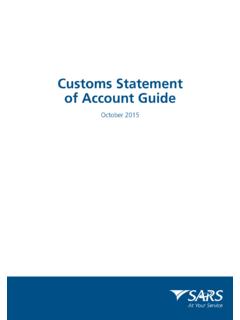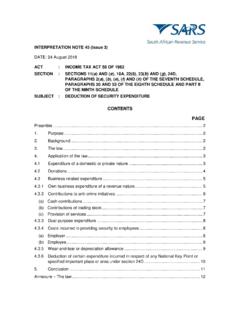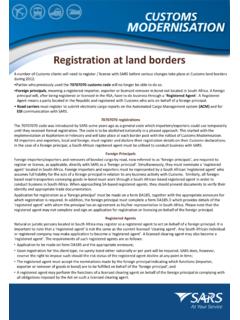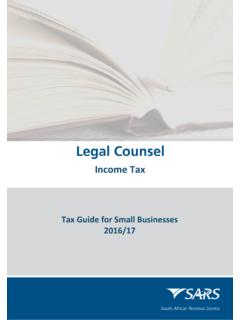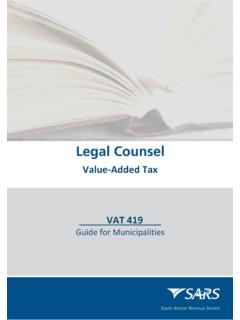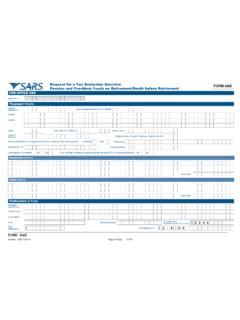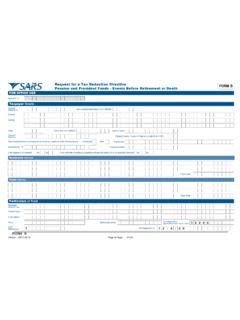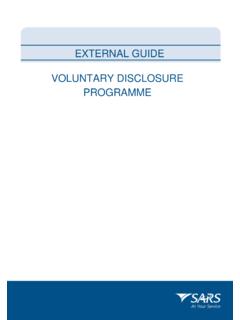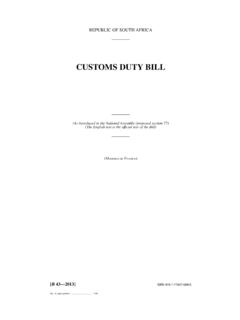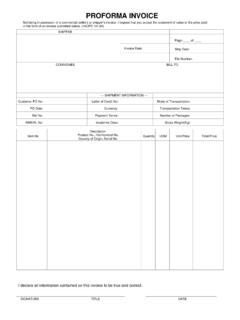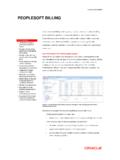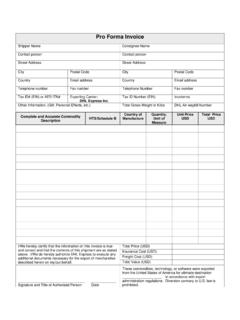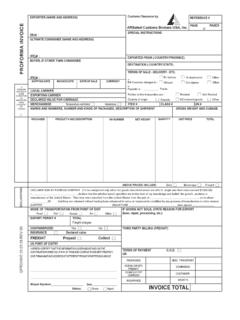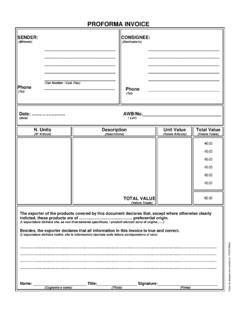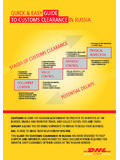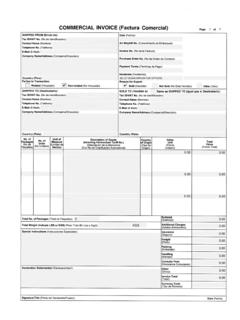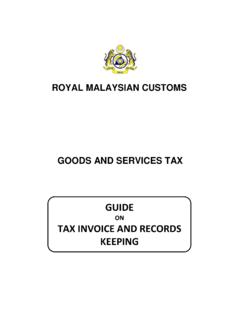Transcription of SC-CF-30 - Invoice Requirements for Customs - Ext Policy
1 EFFECTIVE DATE 31 March 2011 Invoice Requirements for Customs - External Policy SC-CF-30 Revision: 0 Page 1 of 7 Customs AND BORDER MANAGEMENT EXTERNAL Policy Invoice Requirements FOR Customs EFFECTIVE DATE 31 March 2011 Invoice Requirements for Customs - External Policy SC-CF-30 Revision: 0 Page 2 of 7 TABLE OF CONTENTS 1 SCOPE 3 2 Policy 3 When an Invoice is required 3 Types of invoices 3 Minimum Requirements for an Invoice to be accepted by Customs 3 Where the Invoice contains inadequate information or no Invoice is available 4 When an amended Invoice required 5 Record Keeping 6 Penalties 6 3 REFERENCES 6 Legislation 6 Cross References 6 4 DEFINITIONS AND ACRONYMS 6 5 DOCUMENT MANAGEMENT 7 EFFECTIVE DATE 31 March 2011 Invoice Requirements for Customs - External Policy SC-CF-30 Revision: 0 Page 3 of 7 1 SCOPE a) The purpose of this Policy is to document the minimum Requirements on an Invoice , as prescribed by law, in order to make due entry when importing goods.
2 B) This Policy is for all Customs Clients, with specific focus on the Invoice Requirements . c) This Policy does not cover the Invoice Requirements for exported goods. 2 Policy When an Invoice is required a) Section 39(1)(c) requires the importer to produce documents including an Invoice . b) In terms of Section 40 a Customs declaration (amongst other Requirements ) will not be valid if a correct and sufficient Invoice , as prescribed, is not available on request. Any goods taken, delivered, or removed by virtue of an invalid declaration shall be deemed to be goods landed or taken without a due entry. Such goods would be considered illicit goods liable to forfeiture in terms of Section 87. Types of invoices TYPE OF Invoice DESCRIPTION / USE C & F Cost and freight CIF Cost, insurance and freight CIFI Cost, insurance, freight and interest Commercial Generally indicate the final selling price(s) of the goods Consular Invoice declared before a consul (diplomat; ambassador; representative) FAS Free alongside ship FOB Free on board FOR Free on rail Franco Includes freight, charges, duty, landing, railage, commission, profit, etc.
3 , for delivery at site in the country of destination and such documents must specify all the items separately in order to arrive at a correct FOB price Loco First cost of goods, normally ex-works Pro forma Produced in the absence of any Invoice and should be examined to ascertain the correct nature, contents and quantity of the goods Minimum Requirements for an Invoice to be accepted by Customs a) The clearance of goods for home use or any other Customs procedure requires that an Invoice must: i) Be in one (1) of the official languages; ii) Be issued by the person who: A) Exports the goods to South Africa; or B) Supplied the goods that are exported to South Africa; iii) Be a true reflection of the transaction which is the cause for the goods to be exported to South Africa, including: A) The nature of the transaction; B) The goods to which the transaction relates; and C) The amount payable in terms of the transaction; iv) Reflect the country of origin; v) Display: A) The date of issue; B) The name and physical address of the issuer; C) The name of the person to whom the Invoice is issued; D) The price paid or payable and I) Commissions; II) Discounts; III) Costs; EFFECTIVE DATE 31 March 2011 Invoice Requirements for Customs - External Policy SC-CF-30 Revision: 0 Page 4 of 7 IV) Charges; V) Expenses; VI) Royalties; VII) Freight costs; VIII) Taxes; IX) Drawbacks; X) Refunds; XI) Rebates; XII) Remissions; or XIII) Other information whatsoever that affects the price or price payable; and E) Any other information as may be prescribed by Rule, such as in the case of forward exchange contracts.
4 And vi) Contain all particulars necessary to make a valid entry (as defined in Section 40), assess the duty due and compile trade statistics, including: A) All particulars or information of the final amount of the transaction value; B) Any proprietary or trade name of such goods; and C) A full description of the nature and characteristics of such goods as at time of importation. b) Description of the nature and characteristics of such goods i) Section 41(2) makes provision for an identification number, code description, character or other mark to be allocated to goods of a class specified in the Rules, as the use of long trade descriptions is not practical. In such cases the importer must also be able to supply a list detailing what each code refers to. A) The description of the goods given in the Invoice must be sufficient in detail to enable the goods to be identified for tariff purposes.
5 B) Where the tariff classification depends on such factors as the physical characteristics of the goods, for example, weight, capability, composition, method of manufacture, etc. the description given on the Invoice must include these particulars. C) The quantity must be supplied. ii) Section 41(3) stipulates that all particulars on an Invoice must describe the goods as they are or will be at the time when imported into South Africa. If the goods are examined or analysed post clearance and the goods differ from those described on the Invoice , Customs will deem the Invoice to be incorrect, unless the importer can prove otherwise. Where a change in conditions between landing and examination or analysis is proven and the outcome is: A) Not in favour of Customs , then the Commissioner may, in his / her discretion, insist on clearance according to the invoiced particulars; or B) Not in favour of the importer and he / she can prove any changes and the extent thereof, then clearance can be made in accordance with the result of the examination or analysis.
6 C) Where the Invoice is addressed to a person other than the importer, this may require further investigation. Where the Invoice contains inadequate information or no Invoice is available a) Where goods are imported by private persons for own use (not for commercial purposes) and Customs can satisfy themselves that the revenue is not prejudiced in any way, the goods may, at Customs discretion, be released without the production of an Invoice . This will not apply in cases where goods of a high value and liable to duties, for example, fur coats and jewellery, etc., are imported by private individuals. In such cases an Invoice must be insisted upon or valuation must be resorted to. b) Sight declarations - Where no invoices are available and the goods are sighted importers may make due entry after sight in the usual manner in accordance with the result of the examination.
7 If the examination has revealed sufficient detail to enable proper entry and the goods are not subjected to anti-dumping duty release may be granted against an indent / covering statement or other satisfactory evidence of value for permit / wharfage purposes. EFFECTIVE DATE 31 March 2011 Invoice Requirements for Customs - External Policy SC-CF-30 Revision: 0 Page 5 of 7 c) Section 41(4)(c) allows Customs to determine a transaction value (using the methods provided for by the Act), origin, date of purchase, quantity, description or the characteristics of such goods according to the best information available to Customs at such time, if: i) Any particulars referred to in Section 41(4)(a) of any imported goods are not declared in the prescribed Invoice ; ii) Any change in the particulars declared in any Invoice relating to any imported goods which occurred after the date of issue of the Invoice is not immediately reported to Customs by the importer; or iii) If Customs has reason to believe that an offence referred to in Sections 86(f) or 86(g) has been committed in respect of any imported goods.
8 D) Section 41(4)(c) empowers Customs to determine particulars when all other means of obtaining the correct particulars, for instance from the exporter (supplier or manufacturer) or the importer, have been exhausted. e) In the event that a conflict between the provisions of Sections 41(4)(c), 65(4) and 66(9) regarding the determination of the transaction value may exist, the specific value determination provisions of Sections 65(4) and 66(9) must prevail, taking into consideration the World Trade Organisation (WTO) Agreement. f) In dealing with invoices showing delivered prices (also called Franco invoices) the following should be borne in mind: i) Freight, insurance, South African clearing charges, duty and railage to destinations which suppliers include in their selling price, are estimated and should consequently be verified in order to arrive at the correct FOB price; and ii) Suitable provisional payments should be secured pending production of proof of the exact amounts paid to the service providers of these charges.
9 Refer to SC-CR-A-04 and SC-CR-A-04-S1 and SC-CF-30 -S1. When an amended Invoice required a) An Invoice is amended by the issuing of: i) An amended Invoice replacing the previous one (1); ii) A supplementary Invoice (if the Invoice is split); or iii) A debit or credit note. b) Customs may allow or request an Invoice supporting the clearance of any goods to be amended, if accompanied by a statement setting out the reasons for the amendment and any documentary proof substantiating those reasons: i) If it is necessary to insert information or correct any incorrect information on the Invoice ; ii) If the amount paid or payable in terms of the transaction as reflected by the original Invoice is affected by an amount credited or debited by the issuer of the Invoice ; iii) If a refund on the amount paid in terms of the transaction reflected by the original Invoice has been made by or has become due to the issuer of the Invoice .
10 Iv) If payment other than the amount payable in terms of the transaction reflected by the original Invoice has been made or has become due to the issuer of the Invoice , whether directly or indirectly, in any manner and that payment affects the amount payable in terms of the transaction; v) If there has been a change in the particulars, characteristics or nature of the goods after the date of issue of the Invoice ; or vi) If splitting of the Invoice is necessary for any reason, including for the purposes of facilitating tax administration. c) The Act places an obligation on the supplier of the imported goods to issue an amended Invoice whenever any debit or credit is passed or any change in the particulars reflected in an Invoice takes place after the date of issue to the importer. The importer in turn is required to produce the amended Invoice to Customs within one (1) month of the date of receipt thereof and report the circumstances.
